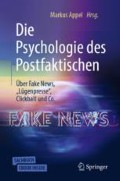Zusammenfassung
Dank unseres leistungsfähigen Gehirns können wir eine Vielzahl von Lebensaufgaben bewältigen. Unsere Fähigkeit der Informationsverarbeitung lässt uns komplexe Situationen und Sachverhalte verstehen, aus Erfahrungen lernen, die Zukunft planen, mit anderen Menschen kommunizieren, Wissen aneignen und vieles mehr. Das Bild vom perfekten „Homo Ratio“ ist jedoch nicht ganz zutreffend.
Access this chapter
Tax calculation will be finalised at checkout
Purchases are for personal use only
Literatur
Aronson, E., Wilson, T., & Akert, R. (2008). Sozialpsychologie (6. Aufl.). München: Pearson.
Baron, J., & Hershey, J. (1988). Outcome bias in decision evaluation. Journal of Personality and Social Psychology, 54, 569–579.
Cho, H., & Boster, F. (2008). First and third person perceptions on anti-drug ads among adolescents. Communication Research, 35, 169–189.
Christensen-Szalanski, J., & Willham, C. (1991). The hindsight bias: A meta-analysis. Organizational Behavior and Human Decision Processes, 48, 147–168.
Davison, W. (1983). The third-person effect in communication. Public Opinion Quarterly, 47, 1–15.
Dechêne, A., Stahl, C., Hansen, J., & Wänke, M. (2010). The truth about the truth: A meta-analytic review of the truth effect. Personality and Social Psychology Review, 14, 238–257.
Eagly, A., Ashmore, R., Makhijani, M., & Longo, L. (1991). What is beautiful is good, but …: A meta-analytic review of research on the physical attractiveness stereotype. Psychological Bulletin, 110, 109–128.
Ehrlinger, J., Gilovich, T., & Ross, L. (2005). Peering into the bias blind spot: People’s assessments of bias in themselves and others. Personality and Social Psychology Bulletin, 31, 680–692.
Fernbach, P., Rogers, T., Fox, C., & Sloman, S. (2013). Political extremism is supported by an illusion of understanding. Psychological Science, 24, 939–946.
Furnham, A. (1986). The robustness of the recency effect: Studies using legal evidence. The Journal of General Psychology, 113, 351–357.
Gauggel, S. (2008). Was ist Kognition? Grundlagen und Methoden. In T. Kircher & S. Gauggel (Hrsg.), Neuropsychologie der Schizophrenie (S. 12–18). Berlin: Springer.
Hastorf, A., & Cantril, H. (1954). They saw a game: A case study. Journal of Abnormal and Social Psychology, 49, 129–134.
Holzman, P., & Gardner, R. (1960). Leveling-sharpening and memory organization. The Journal of Abnormal and Social Psychology, 61, 176–180.
Kahan, D. (2017). Misconceptions, misinformation, and the logic of identity-protective cognition. SSRN Electronic Journal. http://dx.doi.org/10.2139/ssrn.2973067.
Krosnick, J., & Alwin, D. (1987). An evaluation of a cognitive theory of response-order effects in survey measurement. Public Opinion Quarterly, 51, 201–219.
Kunda, Z. (1990). The case for motivated reasoning. Psychological Bulletin, 108, 480–498.
Mullen, B., Brown, R., & Smith, C. (1992). Ingroup bias as a function of salience, relevance, and status: An integration. European Journal of Social Psychology, 22, 103–122.
Nisbett, R., & Wilson, T. (1977). The halo effect: Evidence for unconscious alteration of judgments. Journal of Personality and Social Psychology, 35, 250–256.
Pennycook, G., Cannon, T., & Rand, D. (2018). Prior exposure increases perceived accuracy of fake news. Journal of Experimental Psychology: General, 147, 1865–1880.
Pohl, R. (2004). Cognitive illusions. New York: Psychology Press.
Ross, L. (1977). The intuitive psychologist and his shortcomings: Distortions in the attribution process. In L. Berkowitz (Hrsg.), Advances in experimental social psychology (Bd. 10, S. 173–220). New York: Academic.
Ross, L., & Ward, A. (1995). Naive realism: Implications for misunderstanding and divergent perceptions of fairness and bias. In T. Brown, E. Reed, & E. Turiel (Hrsg.), Values and knowledge (S. 103–135). Hillsdale: Erlbaum.
Rozenblit, L., & Keil, F. (2002). The misunderstood limits of folk science: An illusion of explanatory depth. Cognitive Science, 26, 521–562.
Schmidt, J., & Spreng, R. (1996). A proposed model of external consumer information search. Journal of the Academy of Marketing Science, 24, 246–256.
Skowronski, J., & Carlston, D. (1989). Negativity and extremity biases in impression formation: A review of explanations. Psychological Bulletin, 105, 131–142.
Sparrow, B., Liu, J., & Wegner, D. (2011). Google effects on memory: Cognitive consequences of having information at our fingertips. Science, 333, 776–778.
Sundar, S., & Nass, C. (2001). Conceptualizing sources in online news. Journal of Communication, 51, 52–72.
Swann, W. B., Jr., & Bosson, J. K. (2010). Self and identity. In S. T. Fiske, D. T. Gilbert, & G. Lindzey (Hrsg.), Handbook of social psychology (Bd. 1, S. 589–628). Hoboken: Wiley.
Taber, C., & Lodge, M. (2006). Motivated skepticism in the evaluation of political beliefs. American Journal of Political Science, 50, 755–769.
Todd, P., & Gigerenzer, G. (2000). Précis of simple heuristics that make us smart. Behavioral and Brain Science, 23, 727–780.
Tversky, A., & Kahneman, D. (1974). Judgment under uncertainty: Heuristics and biases. Science, 185, 1124–1131.
Wason, P. (1960). On the failure to eliminate hypotheses in a conceptual task. Quarterly Journal of Experimental Psychology, 12, 129–140.
Author information
Authors and Affiliations
Corresponding author
Editor information
Editors and Affiliations
Rights and permissions
Copyright information
© 2020 Springer-Verlag GmbH Deutschland, ein Teil von Springer Nature
About this chapter
Cite this chapter
Weber, S., Knorr, E. (2020). Kognitive Verzerrungen und die Irrationalität des Denkens. In: Appel, M. (eds) Die Psychologie des Postfaktischen: Über Fake News, „Lügenpresse“, Clickbait & Co.. Springer, Berlin, Heidelberg. https://doi.org/10.1007/978-3-662-58695-2_10
Download citation
DOI: https://doi.org/10.1007/978-3-662-58695-2_10
Published:
Publisher Name: Springer, Berlin, Heidelberg
Print ISBN: 978-3-662-58694-5
Online ISBN: 978-3-662-58695-2
eBook Packages: Psychology (German Language)

